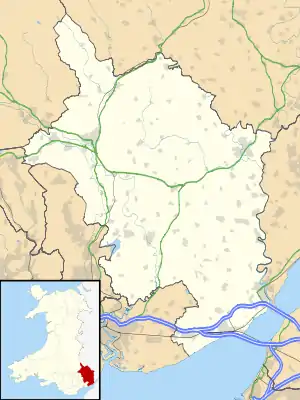Undy
Undy (Welsh: Gwndy) is a village in Monmouthshire, south east Wales, adjoining the village of Magor with which it forms the community and parish of Magor with Undy. It is located about 3 miles (4.8 km) west of Caldicot and 10 miles (16 km) east of Newport, close to the junction of the M4 and M48 motorways, and adjoins the Caldicot Levels on the north bank of the Bristol Channel.
History
The area was settled in Roman times. In 1996 a stone coffin dating from the 3rd or 4th century was found during building work, containing the skeleton of a young woman.[1]
The village name is of uncertain origin. Previous spellings include Wondy, as noted by William Camden in 1610.[2][3] The manor was an early seat of the Seymour family. The parish church of St. Mary contains a 13th-century west window and font, and an archway and porch from the same period or slightly later.[4] It was substantially rebuilt around 1880.[5]
The village underwent major expansion in the late 20th century, following the development of nearby Caldicot and Magor as suburban housing areas for those working in Newport, Cardiff and Bristol.
Amenities
Undy village (along with Magor) supports a village community with a church and an athletic club to the eastern side of the village. It has a clubhouse and dedicated pitches alongside the railway line and is the focal point for many sporting and social activities
Railway
The main railway line between Swansea and London passes through Undy, although there is no station now. Between 11 September 1933 and November 1964 there was a small halt[6] (at 51.578°N 2.819°W), although this was only half a mile to the east of the existing Magor railway station. This halt, like Caldicot, consisted of little more than two wooden platforms made from old sleepers and a footbridge. From 1941 the main line was doubled to four running lines, with the outer two lines as slow goods-only lines to serve the increasing wartime coal traffic, without delaying fast trains on the central main lines.[7] The main lines also included a pair of water troughs and their large supply tank.[8] Although these troughs were removed by the end of steam services in the 1960s, their location is still used to water the occasional steam-hauled special services on this line.
References
- Roman age burial at Undy
- Undy in Camden's Britain
- Also spelled 'Wondy' in Herman Moll's county map of Monmouthshire, c.1724
- John Newman, The Buildings of Wales: Gwent/Monmouthshire, 2000, ISBN 0-14-071053-1
- Joseph Bradney, A History of Monmouthshire: The Hundred of Caldicot, 1933
- Hodge, John (2002). The South Wales Main Line. Part Two: Severn Tunnel to Newport. Wild Swan Publications. p. 36. ISBN 1-874103-76-3.
- Hodge, South Wales Main Line & 2, p. 35
- Hodge, South Wales Main Line & 2, p. 31

